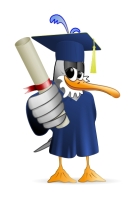FSOSS 2008 : Thursday

After Fardad Soleimanloo picked me up at the Hotel, I discovered Seneca College. Nice school. The conditions for students seems to be excellent. Lucky students :-)
Very kind welcome, where I met Rose Saliba, Chris Tyler, and David Humphrey for true (IRC is .. different :) ). Time to start :) Everything has been recorded, and videos will soon be available.
Our topic was : Teaching Open Source. Seneca College Professors invited me to participate to "The Professor's perspective" topic, scheduled after the studen'ts perspective.
The Student's perspective was incredibly interesting. Animated by Mark Surman (from the Mozilla Foundation staff), we have heard very good students, who explained their experience, and what they really think about the Open Source teaching. What is good, what is not. I noticed carefully Armen Zambrano (who contributed to the Mozilla unit test server) gold remark : "if you prepare yourself for teaching/learning Open Source, don't expect to be ready: you'll never be".
That's so true : this is a continuous challenge, where everybody learns for himself, and from the other.
Then it was our turn. The debate was animated by David Eaves. We previously commonly agreed to not use slides, or 3 only if ever. So I just prepared notes, about what is the most important for me, about teaching Open Source. The video contains everything, but what I'll retain is, all the people around the table arguments, show they do it for true: most of the points we discussed, are shared, because this is just the reality.
For example, all the students are different, and ask the same questions, in a different order. And if you want to attract them, this is extremely time consuming, and you must have 1) dedicated IRC channel for that, and 2) dedicated people to welcome them, and doing the intermediate, e.g. connecting them to the right devs.
Another interesting point was : what about the difficulty ? Is the teacher always able to solve the problem itself ? or not ? Answers differed. From my side, I try to always propose subjects I could work on myself, with a correct chance to complete, but I agree the fact, nobody can know/do everything, and sometimes, doing the task you have to face difficulties discovered at the begining.
Last, the role of the teacher is more to welcome, teach methodology, what are the rules in a community project, and connect to the core developper, when it's time, but not before.
Nevertheless, the common denominator of everything, is everybody is more motivated when the task is usefull (I mean to all the "fake" projects student do every year, just to obtain their credits).
And like it is described (French, sorry) there, the purpose of Education is not to make the sweet edges of a bitter cup, but rather to make the bitter edge of a cup sugar, i.e. systematically proposing that is great and difficult, having just graduated care of the problem throughout the year.
Next was the Institution perspective. Greg De Koenigsberg ( Community Development Manager, Red Hat Inc. ) was great. I noticed there are resources, but what cares is more how to be sure the prof does the right thing, and how to correctly evaluate the students.
I don't remember how the topic cames on that, but the bad thing is, yet another time, people admitted OpenOffice.org has a low acceptance in Educational system. I proposed people to send me feedback, including the two most important reasons they know.
Time to lunch : even during lunch, was a brainstorming (I think real motivated people never stop thinking to that :) ).
Afternoon was about the community perspective. Was interesting, and was a new brainstorming in little groups, about Apprentice and Teaching Models, Prof incentive and skills, What can we do together. Was followed by a dring, and the speakers Dinner. Back to the Hotel early ( Jet lag killed me).
""""""""""""""""""""""""""""""""""""""""""""""""""""""""""""""""""""""""""""""
Education Project on the wiki
EducOO.org blog (french)
Many thanks to Ben Bois , author of the Education Project Logo
Libellés : community, FSOSS, Seneca, Teaching OpenSource



<< Accueil